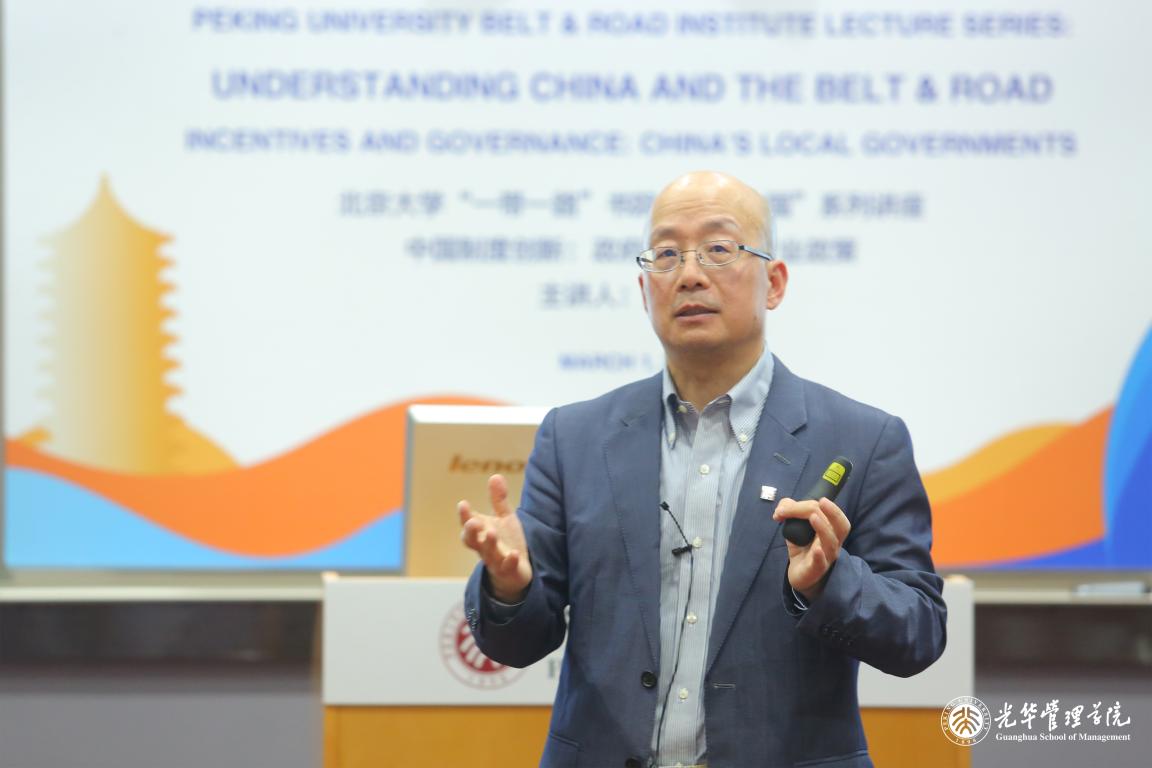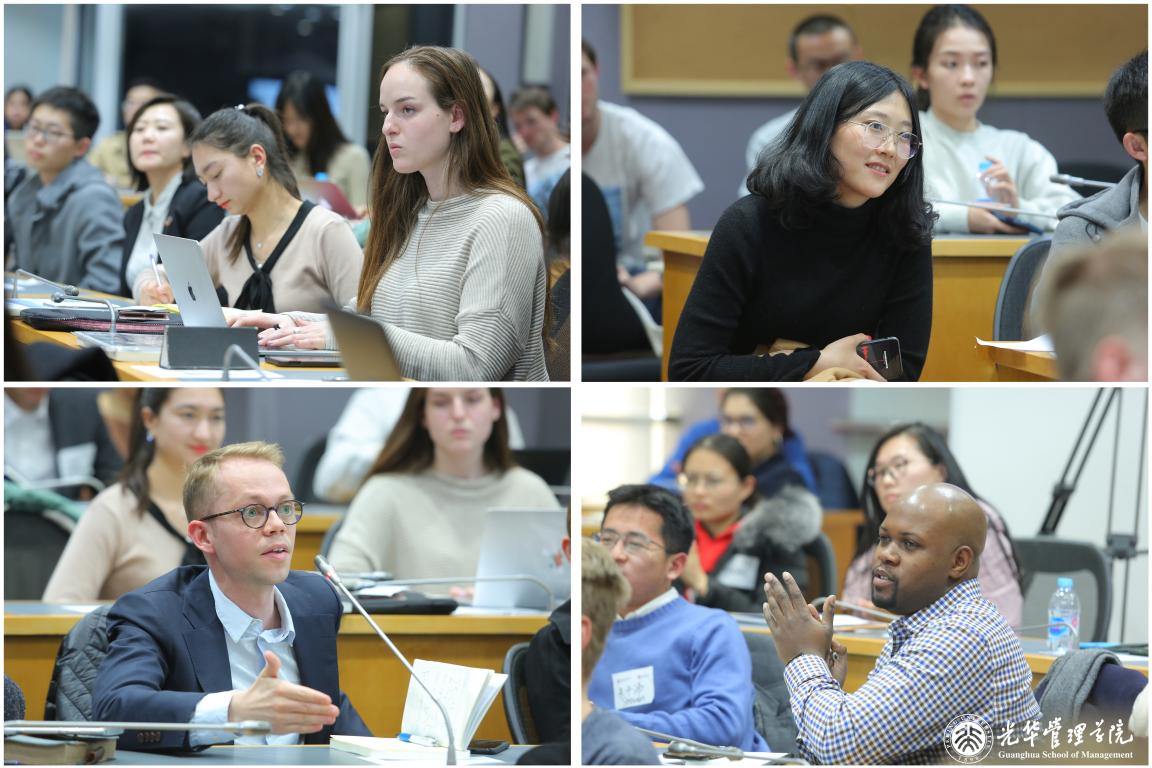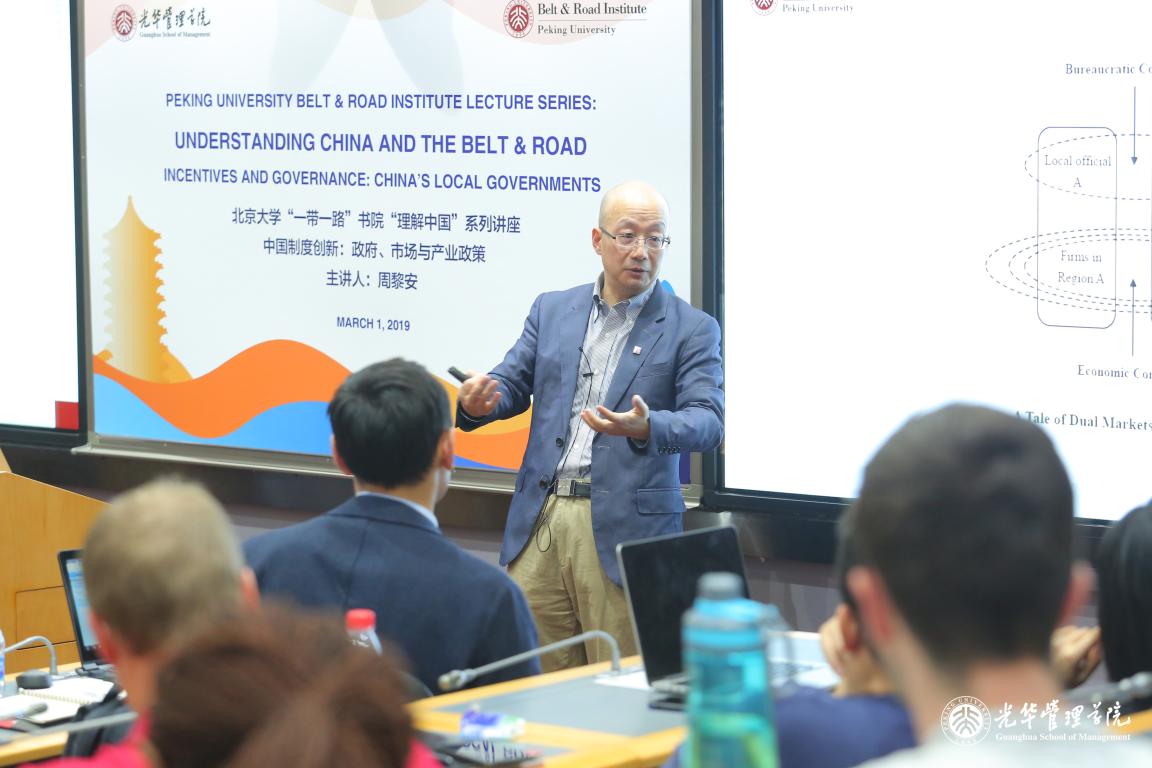On March 1st, Peking University's Belt and Road Institute invited ZHOU Li’an, Associate Dean and Professor of Economics at the Guanghua School of Management, to deliver the fourth lecture in the Institute’s “Understanding China and the Belt & Road” Lecture Series. Themed "China's Institutional Innovation: Government, Market and Industrial Policy", Professor Zhou’s lecture focused on explaining economic development with Chinese characteristics from the perspective of local officials' incentives and related governance mechanisms. More than 100 guests from nearly 40 countries and regions attended the lecture.

Professor ZHOU Li'an
Professor Zhou Li'an's research focuses on political economy, industrial organization, economic transformation and development. His academic achievements have had a wide-ranging impact on his field both domestically and internationally, especially in the areas of officials’ promotion and behavior, governance, political connections, and the long-term effects of the Great Famine. His article "A Study on the Promotion Tournament Model of Chinese Local Officials" was recently recognized as the most-cited Chinese university paper in the humanities and social sciences with over 4000 citations.

Zhou Li'an: A Model of Economic Development with Chinese Characteristics---Dual-Market Model
During the lecture, Professor Zhou Li'an pointed out that China has experienced rapid economic growth in the past few decades, and the contributions made by local governments should not be underestimated. The economic development of local officials’ respective jurisdictions serves as an important performance indicator for promotion. This mechanism gives local governments a relative degree of freedom on how growth is achieved and creates competition between local governments, thereby simultaneously spurring economic development locally and driving growth in the Chinese economy as a whole.
Professor Zhou Li'an reviewed some important examples of China's economic growth and then focused on analyzing the two dimensions of the incentive mechanism encouraging local governments to improve economic development. The vertical dimension of this mechanism involves an administrative contracting system between the central government and the local government. Under this system, the promotion of local officials mainly relies on performance indicators tied to local economic development. Local officials enjoy relative autonomy in how to structure and build their local economies to achieve performance goals. As they’ve continuously expanded resources, local governments have increased local fiscal revenues and have built-out their local economies.
The horizontal dimension takes the form of local competition involving political market/bureaucratic competition and economic market competition which collectively create a Dual-Market Model. Officials compete for promotions in bureaucratic competition. Enterprises compete for economic success through market competition. Thus a Dual-Market Model is formed in which the interests of officials and companies become aligned. Under this Dual-Market Model, officials constantly seek to provide a better environment for local enterprises in their jurisdiction and help local enterprises and industries to create more economic value and enhance their market competitiveness. However, officials do face constraints. Their policies and behavior toward on local enterprises are reflected in how these enterprises fare in the market, which means local governments are incentivized to work with local companies to create competitive industries and companies.

Professor Zhou Li'an pointed out that the Dual-Market Model solves the problems brought about by government and market failure and is an example of the “Chinese characteristics” inherent in China’s economic development model.
Professor Zhou also outlined some of the drawbacks of the Dual-Market Model. For example, local governments may focus on creating short-term benefits and ignore issues that fall outside of their promotion assessment criteria. However, new promotion assessment indicators have been added in recent years to encourage officials to focus on issues that go beyond economic development, including environmental governance, technological innovation and poverty alleviation.
The audience actively participated in the question and answer session, quizzing Mr. Zhou on topics including the relationship between the central and local governments and ways to ensure long-term development, the relationship between the Dual-Market Model and the “Belt and Road”, lessons other countries can learn from China’s development experience, and local governments’ consideration of the environment.
Peking University Belt & Road Institute Lecture Series: Understanding China
Over the 2018-19 academic year, the Belt & Road Institute is organizing a series of lectures entitled “Understanding China and the Belt & Road” for local and international scholars alike, aim to provide a platform for high-level analysis and critique from leading Chinese academics, industry professionals and commentators on what lies ahead for businesses as the global environment changes and boundaries shift. The lecture series was officially launched in October 2018 with its seven events attracting more than 1000 students, diplomats, business executives, and organizational representatives from over 40 countries.
 Programs
Programs